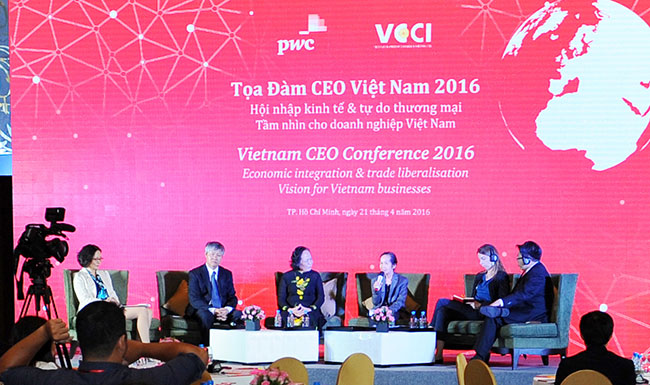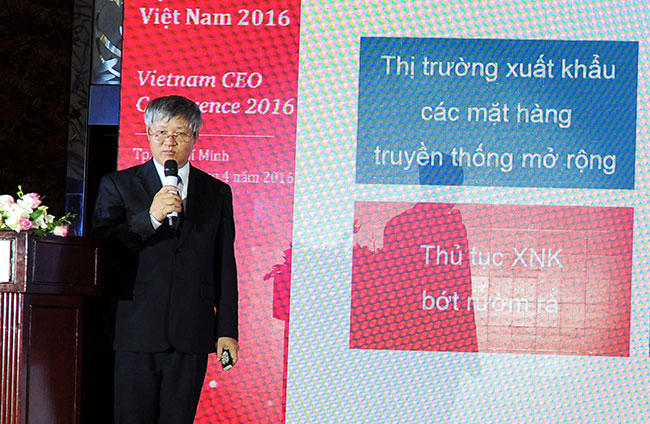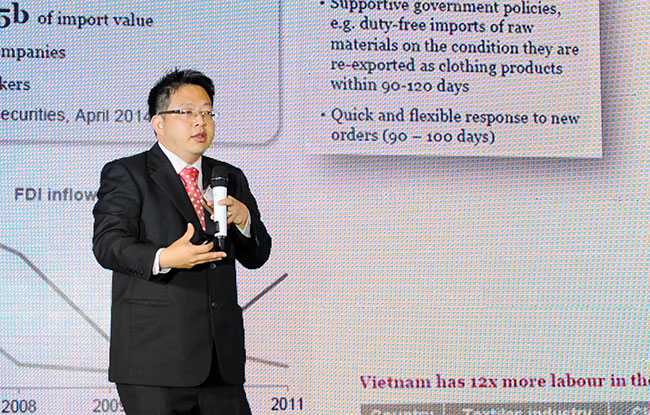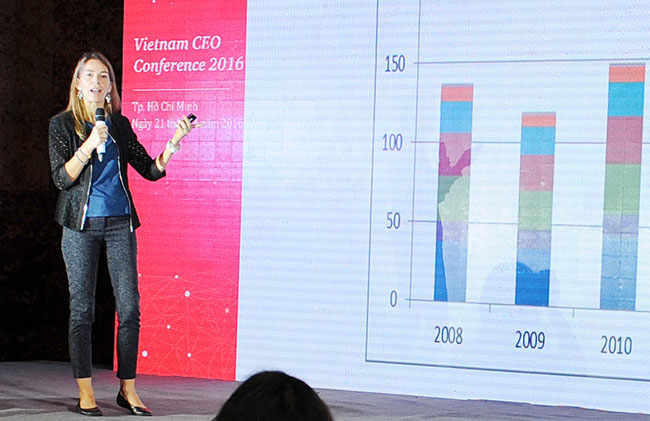Vietnamese companies identify opportunities, challenges presented by trade pacts
 |
About 150 CEOs gathered at the Vietnam CEO Conference 2016, themed “Economic integration and trade liberalisation: Vision for Vietnam businesses”, co-organised today by PwC Vietnam and VCCI, to discuss how Vietnamese businesses can take action to ensure they benefit from free trade agreements (FTAs).
“The trade pacts have brought businesses opportunities together with challenges. We should act immediately,” said Dinh Thi Quynh Van, general director of PwC Vietnam.
With the trade pacts, Vietnamese businesses will have wider and more comprehensive market access opportunities. Reduction or elimination of tariffs or safeguard measures, waiver of fees, various tax breaks, more predictable or lenient penalties, and the liberalisation of non-tariff barriers, on top of consistent customs treatment will also provide a stable environment for businesses to operate in.
Businesses can look beyond their country’s borders to set up their practice or manufacturing centres, hire international professionals and skilled workers, or suppliers, look for foreign investors, and facilitate digital trade among others.
Besides, since the signing of the TPP, Vietnam has witnessed increased foreign direct investment flows. On the other hand, the trade pacts present significant challenges. It appears that several companies, especially small and medium-sized enterprises are not fully equipped with, or have limited access to essential information on FTAs.
 |
 |
 |
The business environment has not been reformed to become as transparent as expected.
If local consumption market is open to foreign goods imported from FTAs’ counterparts, with better branding and quality products, and possibly, lower price, this is an apparent burden on local producers. Vietnamese products have few strong brands to compete in the local market, and yet responding to quality standards required by EU, the US, and Japan to export to these markets.
The local labour market struggles with lack of essential skills, and ILO standards enforcement. These can increase the costs of doing business as organisations will have to spend more on salary, training, and standards implementation and compliance.
Stricter requirements around intellectual property rights, environmental standards, and corporate social responsibility, will make production and operation costs increase. Businesses may be forced to pass these costs on to their consumers (thereby reducing their pricing competitiveness) or absorb these costs, which put higher pressures on their own margins.
In order for Vietnamese companies to be able to compete with foreign counterparts in this context it requires effort from the government too. In his presentation at the event, Vo Tan Thanh, deputy chairman of the Vietnam Chamber of Commerce and Industry (VCCI), said the government can help the business community through institutional reform; innovation and business support, and workforce preparation.
The institutional reform should focus on completion of law and regulations on trading, import and export. Innovation and business support include building law that help connect businesses with global value chains; handle the exchange rate, interest rate and loaning procedures; facilitates business’ innovating and implementing projects. And workforce preparation focuses on improving the professional and foreign language skills of workers.
What the stars mean:
★ Poor ★ ★ Promising ★★★ Good ★★★★ Very good ★★★★★ Exceptional
Latest News
More News
- State corporations poised to drive 2026 growth (February 03, 2026 | 13:58)
- Why high-tech talent will define Vietnam’s growth (February 02, 2026 | 10:47)
- FMCG resilience amid varying storms (February 02, 2026 | 10:00)
- Customs reforms strengthen business confidence, support trade growth (February 01, 2026 | 08:20)
- Vietnam and US to launch sixth trade negotiation round (January 30, 2026 | 15:19)
- Digital publishing emerges as key growth driver in Vietnam (January 30, 2026 | 10:59)
- EVN signs key contract for Tri An hydropower expansion (January 30, 2026 | 10:57)
- Vietnam to lead trade growth in ASEAN (January 29, 2026 | 15:08)
- Carlsberg Vietnam delivers Lunar New Year support in central region (January 28, 2026 | 17:19)
- TikTok penalised $35,000 in Vietnam for consumer protection violations (January 28, 2026 | 17:15)
















 Mobile Version
Mobile Version